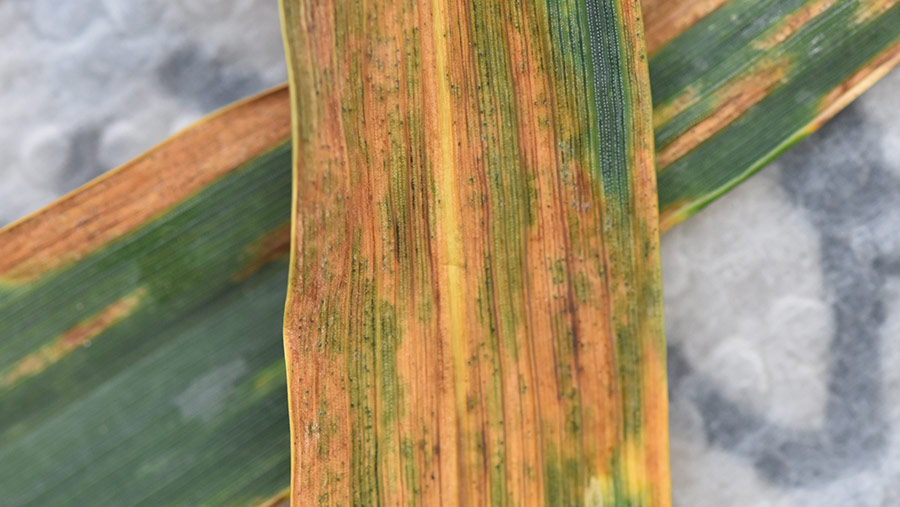Septoria disease explosion hits UK wheat crops
 © Zantra
© Zantra Growers are reporting a tsunami of Septoria tritici infection in winter wheat varieties (see tweets below), despite their Recommended List (RL) ratings saying they should give better protection.
The AHDB said septoria, which can rob crops of up to 30% of yield potential, started to become visible in winter wheat crops in the South and West at the start of June, but is now more widespread over the past three weeks as a result of wet weather.
Mark Bollebakker, senior field trials manager at AHDB, said soft winter wheat varieties, in particular those with Cougar in their parentage, were displaying much higher levels of septoria than their RL disease resistance scores would suggest.
See also: Guide to tackling septoria disease in wheat
This relates to varieties such as KWS Firefly, RGT Saki and Swallow, which is only recommended for the North, as well five new varieties on the RL for 2021-22 – Prince, Illuminate, Quasar, Astronomer and Merit.
The lesions are large, tan-coloured and with relatively small amounts of pycnidia – the spore-carrying body of septoria – for the apparent level of disease on the leaf.
Chris Bean, technical director and agronomist at Zantra, said the lesions seen on some of these varieties looked atypical of septoria and resembled problems last seen in the wet spring and summer of 2012.
Testing at the Food and Environment Research Agency (Fera) in York confirmed that, as in 2012, these lesions were a mixture of septoria and Microdochium nivale, which is primarily an ear disease, but which can develop on the leaves of wheat crops if conditions are right.
Further analysis
Other wheat varieties without Cougar in their parentage are also showing signs of septoria and, potentially because of the type of lesion, microdochium. Further leaf samples have been sent to Fera for analysis.
Mr Bean said: “The fungicide treatments, which have included all of the new actives coming to market in the next 12 months at T2, have performed less well on varieties such as Firefly and Merit, which are of Cougar parentage, compared with an older variety such as Basset, which has a lower septoria rating of 5.2.
“However, bearing in mind the disease symptoms we are seeing on the Cougar lines and the possibility of microdochium being present as well as septoria, and given that most fungicides are less effective against the latter disease, this may be affecting results.”
Mr Bean urged growers to visit their local field trials to find out how varieties they may wish to grow perform in their local geographies, rather than relying on the RL, which is an average of national results.
Jonathan Blake, cereal disease expert at crop consultants Adas, said the wet May and the first year since the loss of chlorothalonil had been a “double whammy” for septoria pressure and the ability to control it.
“Where people have grown more susceptible varieties and disease control has been compromised, we would expect to see some yield loss. But it’s too early to say how much,” he added.
‘Soup of diseases’
Suffolk-based independent wheat breeder Bill Angus said wheat growers were being exposed to an “enormous soup of diseases” this season, including septoria, yellow and brown rusts, fusarium and powdery mildew.
Mr Angus said the “die is cast for this year” and now is the time to think carefully about variety choice for this autumn.
He suggests that a panel of experts should be formed to review the role of fungicides and genetics in plant breeding for septoria control.
“We should also see a return of publishing variety pedigrees on the Recommended List,” he said. “This would give growers and agronomists the opportunity to broaden their choice of varieties by selecting ones with different genetic backgrounds.”
A spokeswoman for KWS UK said: “This year, we are seeing a large amount of septoria in wheat crops which has previously been seen in other countries, such as Ireland. It looks like it has come over here.
“One of our varieties, Firefly, which has a rating of 6.8 for septoria control, along with others from other companies on the Recommended List with Cougar in their parentage, have been affected.
“We are monitoring the situation. We don’t know yet if this season has been affected by the wet weather, or if it’s something which is here to stay. We will know more once we get to harvest and collect the data.”
What farmers and agronomists are saying on Twitter
Top 3 leaves of my experimental Oak Farm Population #wheat vs Firefly. Same expensive fungicide programme but Firefly only has flag left. Septoria rampant. Sadly about half OFP is flat so still lots of more work needed. pic.twitter.com/swy2YRIIKz
— Edward Dickin (@naked_barley) July 13, 2021
Finding more and more Septoria, particularly in wheat on wheat. Scepter also showing a fair bit of Yellow Leaf Spot in certain areas in the same paddocks. Shaping up to be a big fungicide season pic.twitter.com/hHxmsQgGSH
— Daniel Hillebrand (@danhillaz) July 15, 2021
Disease levels (brown rust, Fusarium and Septoria) now increasing rapidly at the Hinton demo site. These two photos of the variety run are taken 7 days apart. pic.twitter.com/flm5wNNSTd
— Ben Giles ?? (@Gilesy256) July 13, 2021
Looking at the impact of the Septoria levels in Saki.
It’s suddenly gone from being a first choice variety for me to the exit door on farm here for next year. pic.twitter.com/nXGuvDIaDW
— Russell McKenzie (@russbmckenzie) July 2, 2021
Untreated varieties, increasing #septoria resistance left to right (4.9 to 8.3): Gravity , Costello, Gleam, Saki, Graham, Sundance, Extase and Theodore. Subject to change of course @BASFcropUK pic.twitter.com/qFVp7J9tOJ
— Mathew Barnes (@MathewKBarnes) July 12, 2021
Untreated varieties, increasing #septoria resistance left to right (4.9 to 8.3): Gravity , Costello, Gleam, Saki, Graham, Sundance, Extase and Theodore. Subject to change of course @BASFcropUK pic.twitter.com/qFVp7J9tOJ
— Peter Cowlrick (@PeterCowlrick) June 4, 2021

